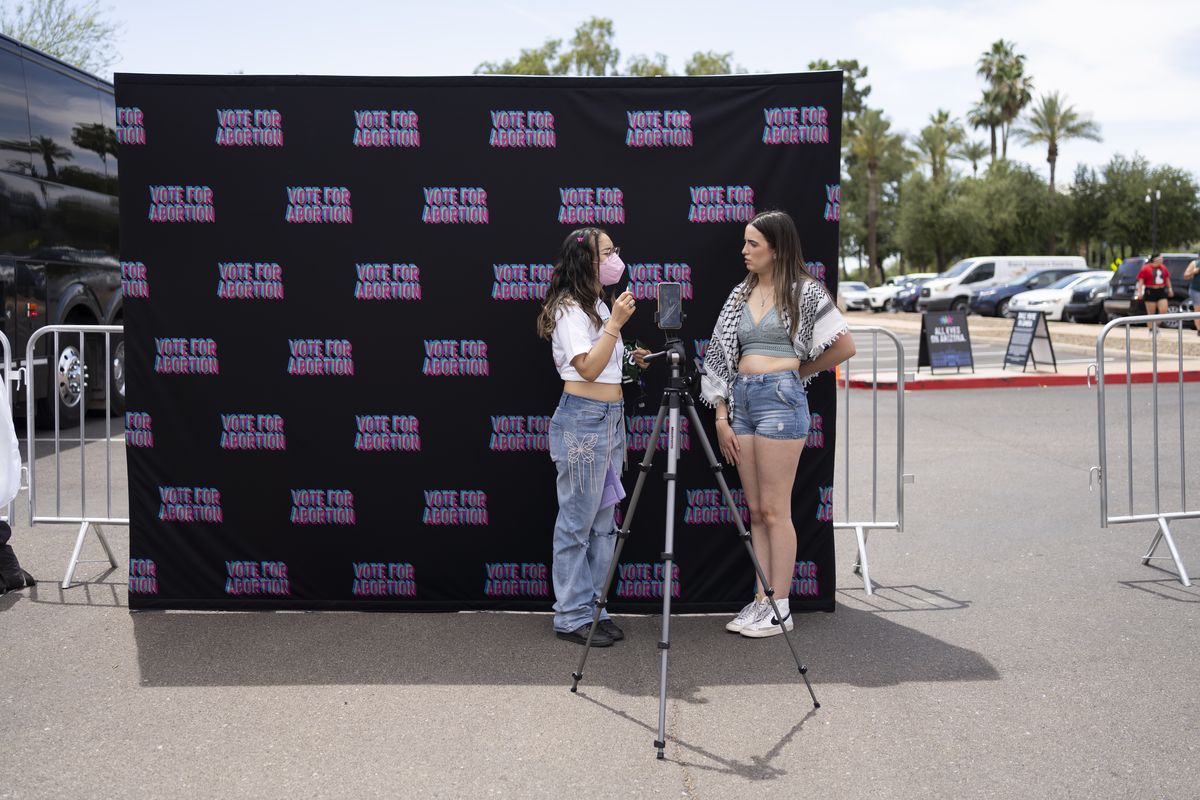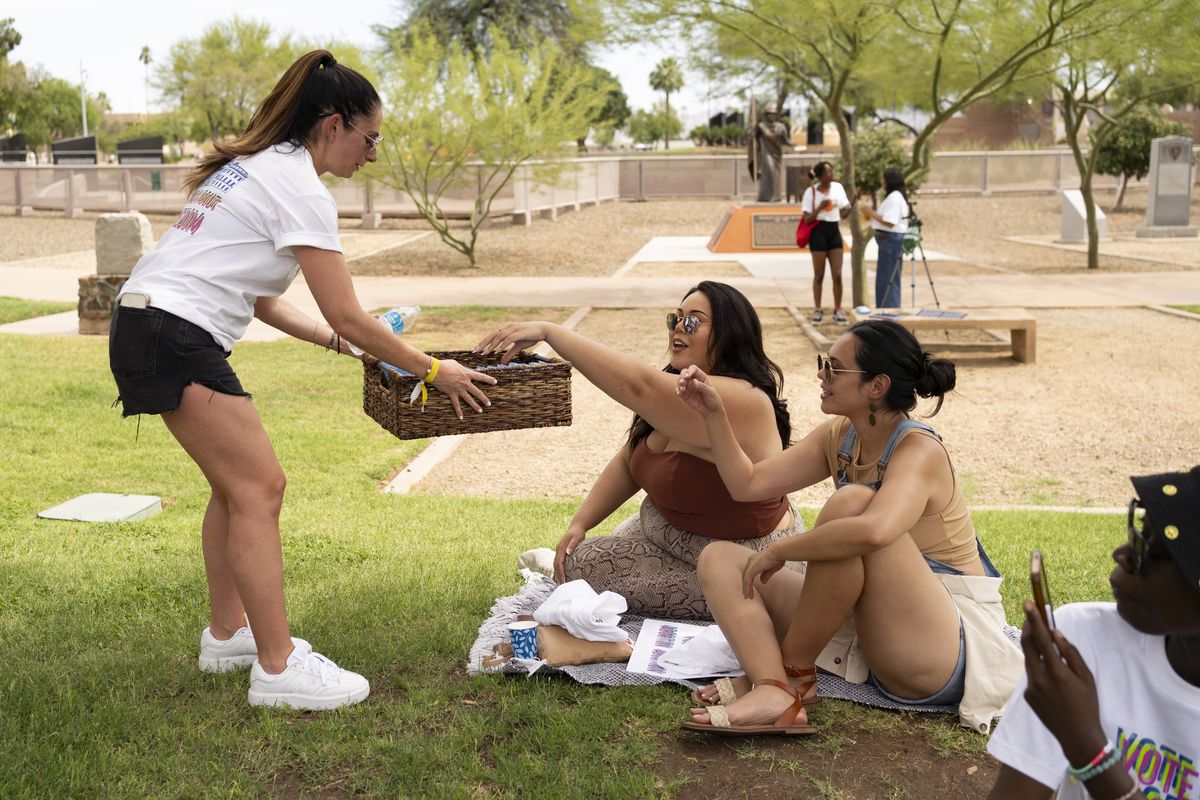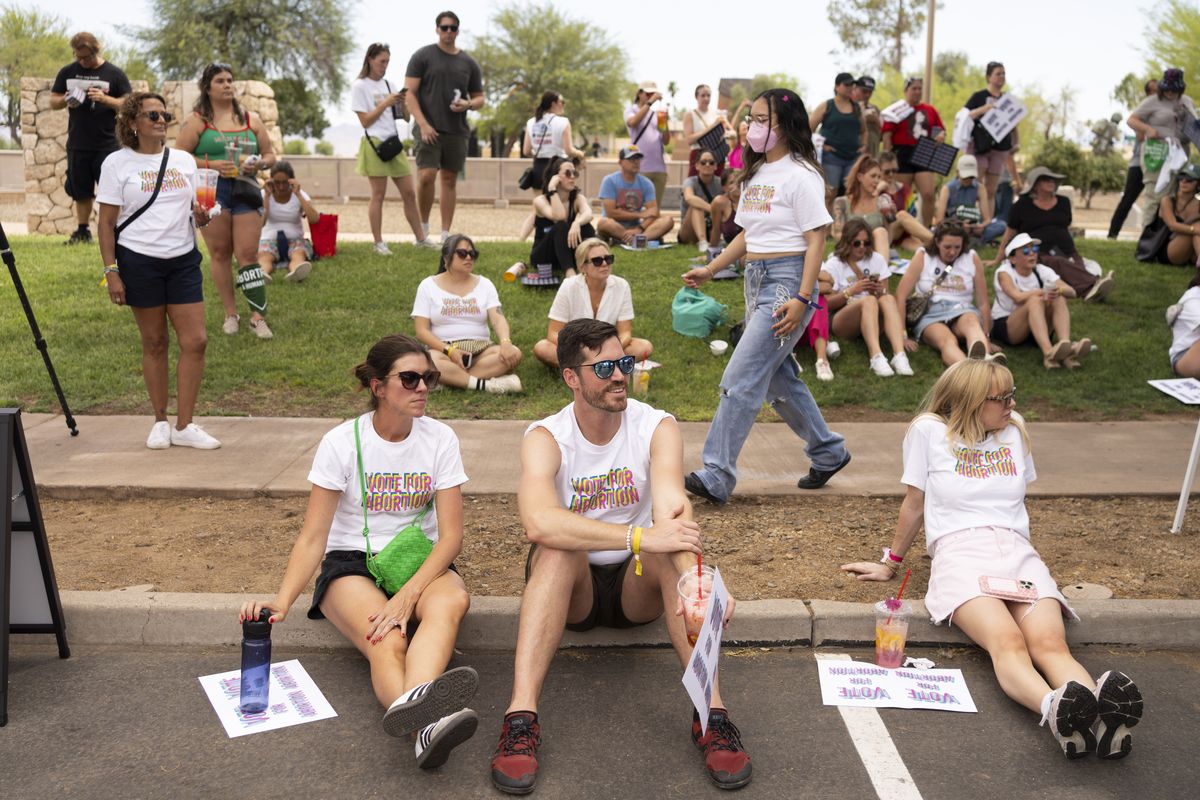Democratic efforts to lure young voters include beer and birth control
Jenny Kay, left, passes out free emergency contraceptive pills during the Vote for Abortion festival at the state Capitol on Saturday in Phoenix. (Rebecca Noble/For The Washington Post)
Hey there, youthful voter.
Are you already over the presidential election? Do the grandfathers leading the two major party tickets bring you down? Do you feel that politics has nothing to do with your life?
A group of Democratic donors thinks it may have found a cure for what ails you – never mind the donors’ own freakout about the widespread youth malaise, given President Biden’s struggles in the polls.
They want to make politics look different in the seven or so states that will decide the presidency – like a dance party, a comedy show or a place to chill out. Sometimes there will be free beer, manicures, boot shines, a rent check sweepstakes, a handout of contraceptive pills or cooling towels. All you have to do is show up, like it’s Super Bowl Sunday, and belong to something bigger. Oh, and someone might mention voting at some point.
“No one throws more simultaneous parties than we do,” Dmitri Mehlhorn, a donor adviser to billionaire Democrats like LinkedIn founder Reid Hoffman, said of Americans. “There are 2.2 million humans in those states under 45 who are just nonvoters, but they do all kinds of other civic stuff.”
The new push – funded with millions of dollars by Mehlhorn’s group, Investing in US, and others – is now being tested in swing states like Pennsylvania and Arizona. The target is younger voters in major metropolitan areas of a few key states who, if they do vote, tend to favor Democrats. Early polls suggest they are more disconnected from the political conversation in ways that could sink Democratic hopes of keeping the White House. The current pilot project results will determine funding for events this fall.
“Turning people out to cultural events is not a hard thing to do. The key thing is to make it fun and keep out the doom and gloom,” said Kevin Mack, the lead strategist for The Voter Project, which has been throwing parties this spring across Pennsylvania to test the theory, under the banner of Stand Up Strong ’24. “They will take actions automatically. It is not a big push.”
Mack’s goal is to turn out 100,024 younger voters in the state this November who otherwise have not voted this year. He held a Saturday concert in Bucks County before the February special election this year, offering free food trucks, beer and a performance from a band, Couch, that came down from Boston.
He recently took over a community center in Philadelphia, with talks for artists, opportunities to meet people, and most notable, a raffle that gave away one month of rent to people who checked their voter registration. There are plans for an Olympic village of sorts this August in Philadelphia, celebrating athletes in Paris. Free beer is also on the fall agenda.
In Phoenix on Saturday, a group called Vote for Abortion drove around the city in a bus handing out free emergency contraceptives and feminine hygiene products to create buzz for a midday concert by Lauren Jauregui, with DJs and appearances by local influencers and the actress Busy Philipps. Biden’s name was not central to the pitch.
Other groups are exploring the idea of early morning raves near early voting spots in states like Pennsylvania, where there will be five weekends of early voting in some counties this year. A group called Pizza to the Polls plans to repeat its efforts delivering food to people in long lines on Election Day.
“It is very 19th century in a way,” said Donald Green, a political scientist at Columbia University, who has studied the effectiveness of staging parties near polling places to get out the vote. “Before the so-called progressive era reforms of 1880s, you would have a marching band, you would have entertainment, you would have free whiskey for a male-only electorate.”
Since then, state and federal laws prohibit giving whiskey or anything else of value in exchange for a vote or voter registration. But state election laws generally do not prevent giving away money, food or other types of enjoyment to encourage civic participation or in proximity to voting. Nonprofits that use tax-deductible donations from anonymous donors can pay for it all as long as the effort does not encourage fealty to a party or candidate. Sweepstakes are generally allowed as long as there are ways to participate without taking any requested action.
“You have to be able to drink the beer whether you voted or not,” said Brian Svoboda, a campaign finance attorney at Perkins Coie LLP.
Political campaigns have long provided giveaways of a sort, picking up the costs of Pizza Ranch meals ahead of the Iowa caucuses or paying for the massive arena shows that former president Donald Trump likes to put on for rallies. But the Trump campaign still mocks the idea that donors who back Biden need to spend so much to create connections to young adults, even providing alcohol at events.
“The only way a weak, failed, and corrupt leader’s allies can entice a populace to continue four more years of disastrous policies is to get them liquored up. Biden should stop treating young voters, Black and Hispanic voters like they are stupid,” Chris LaCivita, a top Trump campaign adviser, said in a statement. “His liberal financiers will stop paying rent bills and throwing block parties the second the election is over – and go back to ignoring their interests as they always have.”
Green has run multiple studies since 2005 on the effects on turnout from parties held near polling sites when elections are taking place. There is variation in the results, depending on everything from weather to the cachet and skill of the party planners, he said. But when the events work, they can juice turnout by four to six percentage points, at a cost per vote that is lower than other tactics like door-to-door canvassing and phone banking.
The alarms have been going off for a while about an increasing disconnect between young voters and politics and its institutions. A Harvard Kennedy School Institute of Politics poll found a 60 percent drop since 2015 in the share of Americans between the ages of 18 and 29 who claim to have “trust in the president.” One third of college students say they are uncomfortable sharing their political views due to fears of censorship or negative repercussions.
“Now that I think about it, I probably should be talking about it more,” said Isabella Sanchez Castañeda, 26, a podcast producer who participated in one of the recent Stand Up Strong events in Philadelphia, where about $8,000 in rent money was given away through a sweepstakes. “I think that is just a symptom of exhaustion and a symptom of, ‘What are we going to do at this point?’ ”
The hangover from the pandemic and the stay-at-home isolation of the 2020 campaign cycle also inform how Democratic donors approach the challenge of encouraging young adults to make the electoral choice most Americans never wanted.
“I think because of the pandemic and the general heaviness that is in the air right now – the loneliness epidemic – there is some really strong evidence that having these in person gatherings and having them meet face to face is both beneficial to them and beneficial to the cause,” said Ashley Spillane, founder of the Civic Responsibility Project. Spillane ran Rock the Vote, a group that has long tried to increase voting with musical talent.
One effort called Mente, the Spanish word for “mind,” is trying to explicitly use mental health needs to break into the Latino youth culture in Arizona. The group has tried to attract attention with a sweepstakes to give away Bad Bunny tickets, by sponsoring a comedy festival and by building a chill-out tent with free towels and boot shines at a recent Mexican music festival in Phoenix. They offered mental health advice, and conversation, and then suggested that people also check their voter registration.
“Voting messages are not going to land for people who have never seen voting land for them. These people are hurting. They are in crisis,” said Dan McSwain, a co-founder of the group, who has a background in marketing. “Our message is these systems are only going to continue to fail them if they don’t get involved.”
Final decisions on how much will be invested in these kinds of efforts to engage disaffected young people won’t be made until the late summer and early fall, Mehlhorn said. One possibility is that companies glom onto the projects as a chance to market their own product to the same hard to reach demographic.
At the Vote for Abortion event on Saturday, the giveaways were funded by partnerships with ItsAugust, a maker of tampons and sanitary pads, and Julie, the maker of an FDA-approved emergency contraception pill. Mente also had a presence at the event.
“Rather than trying to reinvent the wheel, we are meeting them where they are,” said Jenny Kay, one of the organizers. “We are coming to them.”



